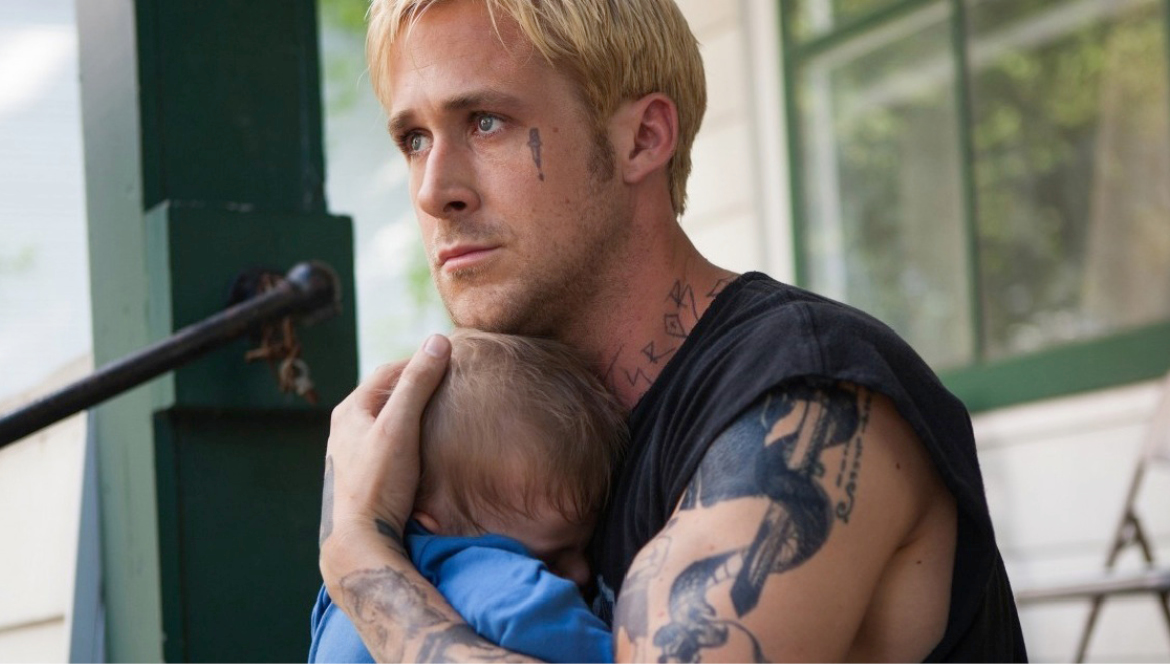|
The
unrelenting bleakness and dour nature of The
Place Beyond the Pines pitches a question about the difference
between
empathy and sympathy for troubled characters. Each of the film's
conflicted
male characters makes poor decisions but only because they are trapped
in
impossible situations, where action seems necessary.
Two out
of three of the film's chronological but interlocking chapters uphold
this
spine of moral ambiguity, only for a clumsy third story to forgo strong
repercussions so that this grim crime saga can resolve itself tidily
and with
undeserved sentimentality. Two overlapping stories, instead of three
linear
ones, would have been leaner and more insightful.

Ryan
Gosling plays Luke, who travels with a fair performing motorbike
stunts. When
he finds out that he has a child to Romina (Eva Mendes), who is already
with
someone else now, he quits his job to try to provide for his son. He
seeks work
from Robin (Ben Mendelsohn), who assists him with robbing banks so that
he can
make enough money to support his son.
In
chapter two Bradley Cooper is Avery, a cop married to Jennifer (Rose
Byrne)
with a son. Avery is wounded shooting someone dead and is falsely
declared a
hero. To redeem himself, he opts to blackmail a group of crooked cops
(one
played by Ray Liotta) and move towards politics. The third story sees
Luke and
Avery's two boys Jason (Dane DeHaan) and AJ (Emory Cohen) growing up
together
in high school and becoming involved with both theft and drugs.

Pines is essentially a Western
but with motorcycles instead of horses. Films about the Old West were
devoted
to the intertwining nature of economics, status and violence. In the
days of
the Frontier, these were pillars of American history, as people
embraced Modernity
and Manifest Destiny: controlling their destinies under God and often
resorting
to violence to achieve and justify the expansion of land and property.
One of
the finest Westerns to deconstruct the myth of righteous violence was
John Ford's The Man Who Shot Liberty Valance (1962).
James Stewart played a lawyer, falsely touted as a hero because people
believed
he shot a bandit dead, and this lie helped bolster his political
career.

Pine's second chapter
offers uncanny symmetry, reflecting how an inescapable lie and violence
leads a
man into political falsehood. Like many other Westerns, the film's
machismo is
totalled through the way violence is used by men to protect or avenge
their
family bloodlines.
The
director was Derek Cianfrance, who previously made Blue
Valentine with Ryan Gosling, a startlingly intimate film about
a corroding marriage. Pines is more
of a genre film, posturing as a character study. There are lumps in the
script,
where characterisation remains extremely thin, existing through action
and
surface than psychology. Both Gosling and Cooper lack personality in
their
performances, being left to brood humourlessly, like they have been
told to
rein in their charisma levels.

The film
is light on back-story, which makes the initial switch in perspective
from Luke
to Avery a misstep. At first, it is extremely difficult to sympathise
with
Cooper's character because he is anonymous to us. His motives gain
transparency
when we see that he needs a stronger job, his father is a judge who
offers him
advice, and that his colleagues force him into a point of no return.
Yet the
moral ambiguity of the characters is tested under the weight of the
script's
excessive nihilism. The film believably expresses economic pressure
through the
love and responsibility that men feel for their families.

However,
the extremity of their actions makes their redemption seem unlikely or
outright
impossible. One example is after Luke assaults Eva's partner he is
freed from
gaol on bail, but then decides to commit another robbery. Likewise,
Avery
decisions are treated as if they are free from choice. Unlike James
Stewart's
character, he chooses to thrive off a lie and the consequences are
perfunctory in
the end.
By the
third story, in a movie that is two hours and twenty minutes long, I
had grown
weary of the films heavy-handedness. The shootings, the beatings, drug
taking,
theft, and multiple robberies, began to seem artificial, employed
solely to inflate
the grittiness and self-importance.

The
credibility of the plotting is also stretched by how contrived the
third
chapter is, relying on the enormity of the coincidence that both Jason
and AJ would
come to know each on a personal level. The grimness of this chapter
unfolds
with little relief, again reflecting a movie where your engagement will
depend
on whether you believe the characters are tragically circumstantial or
if their
pain is self-inflicted.
|